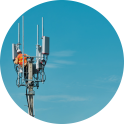Overview
NTIA is the Executive Branch agency principally responsible for advising the President on telecommunications and information policy issues. As part of this mission, the agency leads the federal government’s interagency coordination efforts to promote a whole-of-government approach to connect everyone to affordable, reliable, high-speed internet; align on common policies and practices; provide information on federal broadband investments and their impact; and fulfill statutory coordination activities.
To this end, the BroadbandUSA website provides information regarding funding resources across agencies and federal permitting resources that are relevant to NTIA administered grant programs.
Interagency Coordination Priorities
Whole of Government Approach
NTIA promotes a “whole-of-government” approach by encouraging consistent broadband policies and data, coordinating to maximize the impact of federal funding, and raising awareness about programs and funding options.
Statutory Obligations
NTIA ensures statutory obligations related to interagency coordination are implemented, including those contained in the:
Stakeholder Engagement
NTIA facilitates stakeholder engagement with federal agencies and the FCC by elevating stakeholder concerns, supporting briefings and information sharing, and encouraging regional coordination.
Federal Resources
Federal Funding
To learn more about available federal broadband funding programs, please visit grants.gov and search "Broadband."
Federal Permitting
NTIA is adopting a proactive strategy to streamline and improve broadband permitting across NTIA’s programs and maximize permitting coordination efforts and efficiency with other federal, state, and local agencies. Through the Interagency Broadband Permitting Coordination strategy, NTIA promotes awareness of anticipated surges in permitting applications and establishes relationships and protocols to handle project-specific issues as they arise.









